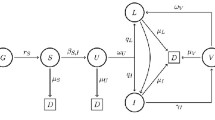Summary
Models of epidemics that lead to delay differential equations often have subsidiary integral conditions that are imposed by the interpretation of these models. The neglect of these conditions may lead to solutions that behave in a radically different manner from solutions restricted to obey them. Examples are given of such behavior, including cases where periodic solutions may occur off the natural set defined by these conditions but not on it. A complete stability analysis is also given of a new model of a disease propagated by a vector where these integral conditions play an important role.
Similar content being viewed by others
References
Bellman, R., Cooke, K.: Differential-difference equations. New York: Academic Press 1963
Busenberg, S., Cooke, K.: Periodic solutions of a periodic non-linear delay differential equation. SIAM J. Applied Math. 35, 704–721 (1978)
Cooke, K., Yorke, J.: Some equations modelling growth processes and gonorrhea epidemics. Math. Biosciences 16, 75–101 (1973)
Cooke, K.: Stability analysis for a vector disease model. Rocky Mountain Math. J., 9, 31–42 (1979)
Cooke, K.: Functional-differential equations: Some models and perturbation problems. Differential equations and dynamical systems, pp. 167–183. New York: Academic Press 1967
Green, D.: Self-oscillations for epidemic models. Math. Biosciences 38, 91–111 (1978)
Grossman, Z.: Oscillatory phenomena in a model of infectious diseases, preprint
Hale, J.: Behavior near constant solutions of functional differential equations. J. Diff. Eq. 15, 278–294 (1974)
Hale, J.: Theory of functional differential equations. New York: Springer 1977
Hoppensteadt, F., Waltman, P.: A problem in the theory of epidemics. Math. Biosciences 9, 71–91 (1970)
Hoppensteadt, F.: Mathematical theories of populations: Demographics, genetics and epidemics, Philadelphia: SIAM 1975
Seifert, G.: Positively invariant closed sets for systems of delay differential equations. J. Diff. Eq. 22, 292–304 (1976)
Author information
Authors and Affiliations
Additional information
This work was partially supported by N.S.F. Grant MCS 7903497
Rights and permissions
About this article
Cite this article
Busenberg, S., Cooke, K.L. The effect of integral conditions in certain equations modelling epidemics and population growth. J. Math. Biology 10, 13–32 (1980). https://doi.org/10.1007/BF00276393
Received:
Revised:
Issue Date:
DOI: https://doi.org/10.1007/BF00276393




